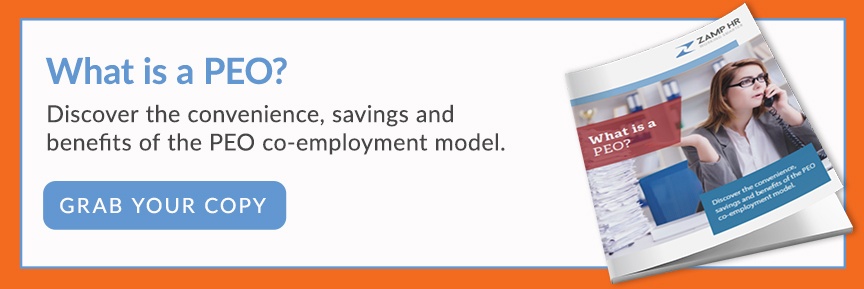About 10 million U.S. businesses outsource their payroll. This isn’t surprising given the potential advantages of outsourcing payroll, especially for small businesses. But there are some disadvantages that you need to consider.
The ROI of payroll processors isn’t the same as with a Professional Employer Organization (PEO). With a PEO, you may be able to mitigate the disadvantages by avoiding dedicated payroll processors and partnering with a comprehensive HR outsourcing provider.
The Pros of Payroll Outsourcing
Outsourcing payroll to dedicated payroll processors isn’t always a bad idea. If payroll is all you need to be done, you may see certain benefits.
Free Up HR’s Time
When you outsource payroll, that can free up your internal HR team’s time to focus on your core business needs, building an attractive culture, and helping to grow your business. Payroll and the associated tasks that go along with it are time-consuming and easy to make mistakes.
By outsourcing payroll, your internal HR team gets their time back and can dedicate that to more useful HR duties. By shedding complex tasks like payroll, you relieve the stress on your HR team.
Cost Savings
When you outsource payroll, you don’t have to hire new HR employees to do payroll as your company grows. Especially for small and mid-sized businesses, cost savings from outsourcing payroll can reduce your overhead.
You can re-allocate those funds to revenue-generating hires when you don’t have to hire new employees for administrative tasks. Your existing internal HR team members can focus on hiring the best employees to fill those roles to keep your business growing.
Payroll Compliance
Payroll is a complex HR task that must be handled correctly every single time. Payroll duties are also subject to federal and state laws, like the Fair Labor Standards Act (FLSA). If your company is not compliant with these laws, you risk costly and embarrassing fines and penalties.
A payroll processor will help you monitor changes in federal, state, and local payroll laws to keep your company compliant. This also sheds this responsibility from your internal team, who may not be fully equipped to handle complex legal compliance matters.
The Cons of Payroll Outsourcing
As with any business decision, there are disadvantages along with advantages. Using a payroll processor is no different and has significant cons you must consider.
Liability for Mistakes
A dedicated payroll processor will not take responsibility for mistakes or noncompliance with laws and regulations. Your company will be solely responsible for any payroll errors they make. This means you still need to review every payroll closely to ensure no mistakes.
This is a time-consuming process that may not save you any time over doing payroll in-house. The worst part is you’re still responsible for any fines resulting from mistakes made by the payroll processing company.
Risk of Payroll Processor Going Out of Business
Payroll processing companies have the same risks of doing business as any other company. If you don’t do your due diligence before partnering with a payroll processing company, you may end up in a difficult situation if that company goes out of business.
Even payroll processing companies have financial difficulties. If they go out of business, you could be left to adjust your payroll process at a moment’s notice, do it in-house with paper checks, and a host of other band-aid solutions that both you and your employees will despise. However, in the worst-case scenario, you may be left with no other options.
Low ROI for Dedicated Payroll Processors
Outsourcing payroll to a dedicated payroll processing company can save your company some money, but ultimately, your ROI will be low. You’ll be paying a steep price for one service and won’t even get liability protection if they make a mistake.
ROI shouldn’t be your only consideration when outsourcing payroll, but it is crucial. Even though you may save some time by using a payroll processor, your ROI will still be low.
Eliminating the Cons of Payroll Outsourcing
Payroll outsourcing simply isn’t enough. The cons of payroll outsourcing stem mainly from dedicated payroll processors. With a PEO, you can avoid the issue of liability mistakes. A PEO will become the employer of record for your employees. This means they will run your company’s payroll, remit taxes to the appropriate government agencies, manage benefits and associated deductions, and help your company stay compliant with ever-changing labor and employment laws.
The best part of a PEO? Because they’re the employer of record, they also hold payroll liability for any mistakes made, reducing your HR risks. Even innocent errors in payroll can lead to costly fines and penalties. With a PEO, not only do they staff HR and payroll experts who work hard to avoid mistakes, if a mistake happens, the PEO is liable, not your company.
Unlike dedicated payroll processing companies, a PEO has an average ROI of 27.2%, making them the better choice for payroll outsourcing. PEOs provide all the advantages of payroll outsourcing without the downsides of using a dedicated payroll processing company.
A PEO is a comprehensive HR outsourcing solution, giving you access to HR, payroll, and compliance experts who can help your company save time and money and work to keep your business compliant and out of trouble with the government. PEOs provide your business with so much more than just payroll processing. And that’s what makes the right PEO such an intelligent solution for your business needs.



